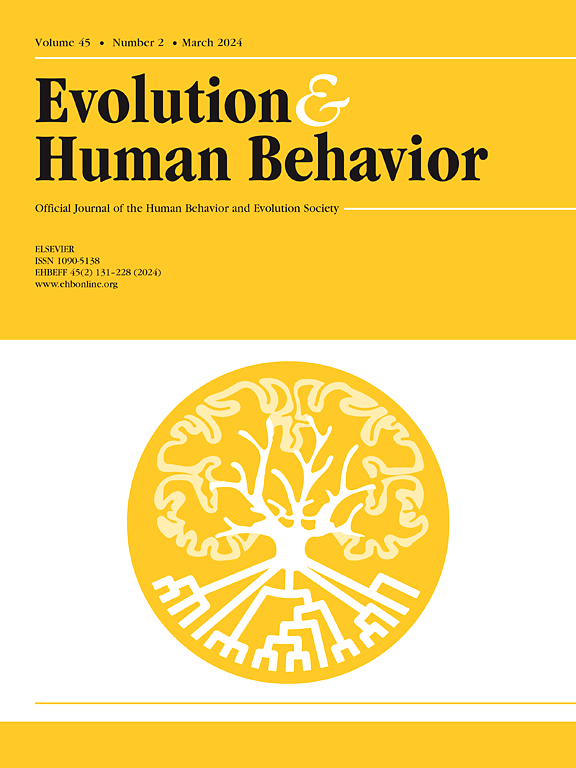The origins of darkness: An evolutionary-developmental integration of Dark traits with the HEXACO
IF 3.2
1区 心理学
Q1 BEHAVIORAL SCIENCES
引用次数: 0
Abstract
Exploitative, selfish behavior has been a topic of interest to researchers across a wide range of domains. One prominent area of research has focused on personality as an important contributor to harmful and selfish behavior. The term “Dark Triad” was coined to identify three selfish personality traits that all share a common core (D): Narcissism, Machiavellianism, and Psychopathy. While numerous candidates have emerged to explain D, evidence suggests that the HEXACO model of personality provides the best fit. In particular, the latent core of the HEXACO trait Honesty-Humility (H) appears to be statistically identical to the latent core of D (r ≈ 0.95). We adopt an evolutionary-developmental perspective to address how this common core may have emerged over evolution as well as developed in individuals. Specifically, we offer: 1) an adaptive explanation of high and low levels of H/D, 2) a parsimonious and plausible evolutionary and developmental model to explain the existence of Dark Triad traits that fits with both modern and historical patterns of human behavior, and 3) an explanation for how developmental and evolutionary processes of modification can change the levels of other HEXACO traits to lead to the expression of not only the Dark Triad, but to an entire array of Dark traits. We end by discussing implications for intervention and understanding personality models of exploitative, selfish traits.
黑暗的起源:黑暗特征与 HEXACO 的进化-发展整合
剥削、自私的行为一直是各个领域研究人员感兴趣的话题。一个突出的研究领域集中在人格作为有害和自私行为的重要贡献者。“黑暗三合一”这个词被创造出来,用来识别三种自私的人格特征,它们都有一个共同的核心(D):自恋、马基雅维利主义和精神病。虽然出现了许多解释D的候选人,但证据表明HEXACO人格模型是最合适的。特别是,HEXACO诚实-谦卑(H)特质的潜在核心与D (r≈0.95)的潜在核心在统计上是相同的。我们采用进化-发展的观点来解决这个共同核心是如何在进化过程中出现的,以及在个体中发展起来的。具体来说,我们提供:1)自适应的解释高和低水平的H / D, 2)一个吝啬的和合理的进化和发展模型来解释黑暗性格”的存在,符合现代和历史的人类行为模式,和3)解释了如何发展和进化过程的修改可以改变其他HEXACO特征的水平导致的表达不仅是黑暗,但整个数组的黑暗的特征。最后,我们讨论了干预和理解剥削、自私特质的人格模型的含义。
本文章由计算机程序翻译,如有差异,请以英文原文为准。
求助全文
约1分钟内获得全文
求助全文
来源期刊

Evolution and Human Behavior
生物-行为科学
CiteScore
8.30
自引率
9.80%
发文量
62
审稿时长
82 days
期刊介绍:
Evolution and Human Behavior is an interdisciplinary journal, presenting research reports and theory in which evolutionary perspectives are brought to bear on the study of human behavior. It is primarily a scientific journal, but submissions from scholars in the humanities are also encouraged. Papers reporting on theoretical and empirical work on other species will be welcome if their relevance to the human animal is apparent.
 求助内容:
求助内容: 应助结果提醒方式:
应助结果提醒方式:


